This is a ranking of the seasons of modern Doctor Who, from 2005 (or NuWHO). I’ll get around do ranking the seasons of Classic Who, but that’s for a different post. I’m looking at the seasons as a whole, so while that mostly means, “were the episodes in it better or worse?”, the structure of the season as a whole and any season long arcs are also factor. I am counting 14 seasons (so FLUX is a season), and then I’ve also included Specials Seasons, which are the three times we’ve gotten a group of at least three specials instead of a season (the five Specials after season 4, the three after Season 13, and the three before Season 14). Other specials I group with the nearest season, with the exception of two during Matt Smith’s time since the BBC insists they are separate, and the fandom agreed, so I’ve ignored them.
And for more info on which episodes brought a season up or pulled it down, check out my ranking of every modern Doctor Who episode:
The Lowest 3rd
The Middle 3rd
The Top 3rd
Now, starting in last place:
#14 Season 13 (FLUX)
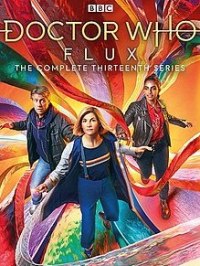 Oh dear god, does Chibnall have no concept of story structure? FLUX is a single adventure split among 6 episodes. Two of those, War of the Sontarans and Village of the Angels, feel like stand alone eps that were rewritten to fit the longer work, but the other four eps cannot stand alone. And as a single, season long story, it is a mess. OK, the good first. The cinematography is very good, probably the best Doctor Who has ever been shot. And Yaz is much more of a character now, even with a bit of agency and less petulant. And while new companion Dan doesn’t do much, he is amiable and a pleasant addition. Semi-companion Jericho is also reasonably well developed. And I like the makeup and performance of the two villains, Swarm and Azure. And that’s it. The rest is junk.
Oh dear god, does Chibnall have no concept of story structure? FLUX is a single adventure split among 6 episodes. Two of those, War of the Sontarans and Village of the Angels, feel like stand alone eps that were rewritten to fit the longer work, but the other four eps cannot stand alone. And as a single, season long story, it is a mess. OK, the good first. The cinematography is very good, probably the best Doctor Who has ever been shot. And Yaz is much more of a character now, even with a bit of agency and less petulant. And while new companion Dan doesn’t do much, he is amiable and a pleasant addition. Semi-companion Jericho is also reasonably well developed. And I like the makeup and performance of the two villains, Swarm and Azure. And that’s it. The rest is junk.
OK, what went wrong: Two many story threads, many left dangling or missing parts. Far too many characters. Extra villains who are irrelevant and underdeveloped (Sontarans, Daleks, Cybermen, The Grand Serpent). Extra allies who were irrelevant and underdeveloped (Vinder, Bel, Kate). No emotions on events that deserve big emotions (trillions upon trillions have died and the universe is in ruins and no one shows any sign of caring). Lots of emotion shown when there’s no explanation of why they deserve any concern (why does the Doctor care about her past?). Vague motivations (what exactly did the Doctor do that so upset The Division? Bringing “hope” is not an answer). Really distracting concepts of the size of the universe (apparently it is very small) and of physics (matter “slows” antimatter…). Everything ended way to quickly.
Word is that the season was supposed to be 10 episodes long and got cut. OK, then there needed to be some re-writes before they started filming that removed things that didn’t matter to the story so that important things still had room.
Best “individual” ep: Village of the Angels
Worst “individual” ep: The Vanquishers
#13 Season 11
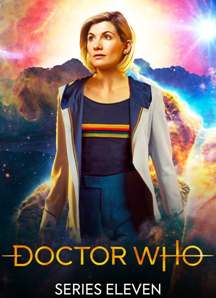 In comes a new Doctor and a new showrunner, creating a season of consistency. Unfortunately, it’s consistently not very good. It doesn’t have the worst episode, but it is close, and it never shines. A majority of the eps sit in the middle of the lower third of all modern Who. It’s easy to blame the generally drab writing, but the problem is larger, with the structure of the show. Perhaps three companions were too many. None of them develop personalities, or enough agency to do anything other than meekly obey The Doctor. And none of them have any kind of relationship with The Doctor. They are non-entities that hardly react, and when two of them are motivated by a recent death, not reacting is a huge problem. This is one of the worst depictions of widowhood I’ve ever seen.
In comes a new Doctor and a new showrunner, creating a season of consistency. Unfortunately, it’s consistently not very good. It doesn’t have the worst episode, but it is close, and it never shines. A majority of the eps sit in the middle of the lower third of all modern Who. It’s easy to blame the generally drab writing, but the problem is larger, with the structure of the show. Perhaps three companions were too many. None of them develop personalities, or enough agency to do anything other than meekly obey The Doctor. And none of them have any kind of relationship with The Doctor. They are non-entities that hardly react, and when two of them are motivated by a recent death, not reacting is a huge problem. This is one of the worst depictions of widowhood I’ve ever seen.
Jodie Whittaker’s general take on The Doctor has potential, but that consistency becomes a problem again. She doesn’t change. Not only does she lack an arc (most Doctors don’t have one), she doesn’t behave any differently in different situations. She’s always the same. She’s a little breathless and rattles off exposition with a single tone. The playful childlike Doctor could work, but she needs to respond to her environment.
Chris Chibnall brings with him a dark, ugly aesthetic. He’s trying to make the show look more cinematic, but he lacks the skill and the money. The blocking is flat, the lighting is dim, and the colors are off. Oddly, to go with that, he makes the show more juvenile, with non-stop messaging to kids to “be the best you can be” and “gosh, you can overcome your disadvantages.” It’s both off-putting and twee.
Best ep: Demons of the Punjab
Worst ep: The Battle of Ranskoor Av Kolos
#13 2022 Specials
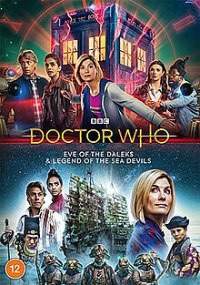 Containing Eve of the Daleks, Legend of the Sea Devils, and The Power of the Doctor, the 2022 Specials continue with the quality, or lack-there-of, that’s marked the Chris Chibnall era. There are unnecessary characters, pointless diversions, and juvenile themes while lacking the fun of earlier eras. And like FLUX, these specials were affected by the COVID lockdown, which is partly to blame for the poor editing and FX of The Sea Devils. On the plus side, only having two companions helped to give each a bit of room to breath, and Dan was the best companion of the era, bringing much needed lightness and fun. And I tend to be rough on Chibnall’s esthetic, but these eps don’t look bad (discounting the editing and FX of The Sea Devils).
Containing Eve of the Daleks, Legend of the Sea Devils, and The Power of the Doctor, the 2022 Specials continue with the quality, or lack-there-of, that’s marked the Chris Chibnall era. There are unnecessary characters, pointless diversions, and juvenile themes while lacking the fun of earlier eras. And like FLUX, these specials were affected by the COVID lockdown, which is partly to blame for the poor editing and FX of The Sea Devils. On the plus side, only having two companions helped to give each a bit of room to breath, and Dan was the best companion of the era, bringing much needed lightness and fun. And I tend to be rough on Chibnall’s esthetic, but these eps don’t look bad (discounting the editing and FX of The Sea Devils).
I’ve ranked these above Season 11, but it’s close. The worst of these specials is worse than any of the Season 11 episodes (though just barely), but Season 11 has more eps that don’t work, so in the end, the 2022 Specials “Season” wins by being shorter, thus having less bad, rather than more good. And Eve of the Daleks is fun.
Best ep: Eve of the Daleks
Worst ep: Legend of the Sea Devils
#11 Season 12
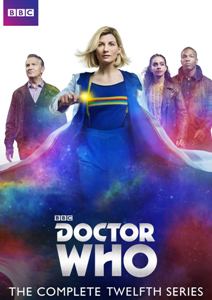 It’s like Season 11, with all its flaws, but a little better. Not much, but a little. The Doctor is still too unchanging, the companions are still drab and have no relationship with The Doctor (but do become petulant once, which is not an improvement), the production is still weak, and the message is still only suited to pre-teens, but individual eps are a step up. The big change was more references to older seasons, with a lot of returning villains, which isn’t in itself good, but the writers seemed to have a better idea of what to do with those.
It’s like Season 11, with all its flaws, but a little better. Not much, but a little. The Doctor is still too unchanging, the companions are still drab and have no relationship with The Doctor (but do become petulant once, which is not an improvement), the production is still weak, and the message is still only suited to pre-teens, but individual eps are a step up. The big change was more references to older seasons, with a lot of returning villains, which isn’t in itself good, but the writers seemed to have a better idea of what to do with those.
There were multiple big reveals, that really didn’t mean much. The Doctor is the Timeless Child… So? How does that effect anything? Why would that effect anything? Big emotional arcs need to be emotional. This one isn’t, and, based on 50 years of the show, shouldn’t be. This is the one time the Doctor is emotional, but we’re given no reason why she’s emotional. Considering how often the Doctor has tossed off past personalities (and sometimes shown distain for past selves), why is this past important? The show needs to show us, not just assume that it is.
Best ep: The Haunting of Villa Diodati
Worst ep: Revolution of the Daleks
#12 Season 10
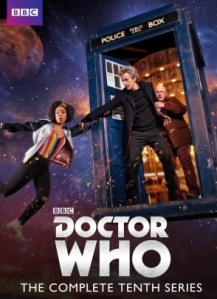
This was the season of unfulfilled potential. Peter Capaldi had perfected his Doctor in season 9 and then was given nothing to do with him. Bill was an interesting new companion, on paper, but never developed a rapport with the Doctor and was made into an idiot by the second ep, and truly annoying by the third. The Doctor was a professor (for 50 years) and that was ignored. The great mystery of the vault was no mystery at all and Missy’s arc promised to be the best part of the season but did nothing and petered out—that might be the season’s greatest flaw as it brings a memorable character to nothing after repeatedly building her up.
The individual episodes were surprisingly close in quality, with a majority ending up in the lowest third. Season 10 doesn’t sink to the abysmal lows of Season 8, but it has eight episodes in my lowest third. I count the Christmas episode Twice Upon a Time as part of season 10 instead of part of season 11 as is usually the case as it has The Doctor, companion, writer, and showrunner from season 10, all of which would change for season 11. And season 10 could use the help.
Best ep: Twice Upon a Time
Worst ep: The Pyramid at the End of the World / The Lie of the Land
#10 Season 8
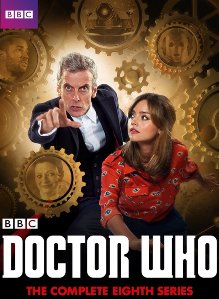 If I gave equal weight to the bad episodes in a season, S8 would end up worse than S12, as this season has some truly awful eps. It has both the very worst and the third-worst. But it also has multiple mediocre eps, which isn’t something to be proud of, but is more than S11 or 12 can say.
If I gave equal weight to the bad episodes in a season, S8 would end up worse than S12, as this season has some truly awful eps. It has both the very worst and the third-worst. But it also has multiple mediocre eps, which isn’t something to be proud of, but is more than S11 or 12 can say.
Clara was weak and distracted. The Doctor was grumpy and miserable; in theory that could make a fine story, but in practice, it was simply unpleasant to watch. Past grumpy Doctors took some pleasure in it. Then there is the arc. Missy/Heaven turned out not to be the arc, as the little glimpses along the way were only preludes to a single two-part episode. The true arc was the Clara/Danny relationship, which was mishandled, starting with the lack of chemistry between the actors, and then going into the poor writing and underdevelopment of the two. It needed warmth, but we never saw that.
Best ep: Dark Water / Death in Heaven
Worst ep: Kill the Moon
#10 Season 14 (aka Doctor Who 2023 Season 1)
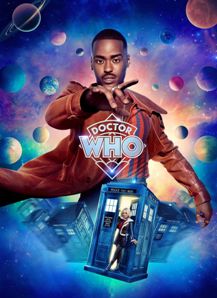 Disappointing is the word of the season. With the return of RTD, the finest show-runner Doctor Who ever had, I expected a lot, and got less. Yes, he fixed a lot of problems, but he introduced some as well. And while there was a lot of good to the season, that disappointment leads to the bad standing out.
Disappointing is the word of the season. With the return of RTD, the finest show-runner Doctor Who ever had, I expected a lot, and got less. Yes, he fixed a lot of problems, but he introduced some as well. And while there was a lot of good to the season, that disappointment leads to the bad standing out.
The season as a whole suffered from its star working on another show (thus giving us two Doctor-lite eps) and its small number of episodes, thus giving us only two standard episodes (Space Babies & Rogue) where we get to know The Doctor and companion as they solve some limited problem, and even those two weren’t completely standard as the first was overly juvenile, and the second separated The Doctor from Ruby for long stretches. This made for a very unbalanced season. Another problem was the poor use of magic. RTD never explained the rules, so it was impossible to determine if there was a real threat or why things happened. Often things just happened, with no rhyme or reason.
An additional problem was the callbacks. We got replicas of scenes from past episodes, characters who were overly similar to those we’ve seen before, and themes the show has already done (The eleventh Doctor spent 8 episodes dwelling on how someone was “special” only to learn they were just a regular person). Which brings me to the seasons failed arc of Ruby’s mother, Susan Twist, and Mrs Flood. The first ended up contradictory and a complete mess, the second was underwhelming, and the third remained a mystery. The season finale needed to stick the landing. It didn’t.
Finally we have the development of The Doctor and Ruby, and unfortunately, they were at their very best at the start of the season. Ncuti Gatwa was great as a joyful, energetic Doctor, until he wasn’t those things, crying and screaming repeatedly. With Fourteen taking away all the grief, it made sense for this to be a happy and stable Doctor. But if for some reason you thinking crying and screaming is happy and stable (I don’t) we have the problem that he did it too much. It stops being a big emotional moment. As for Ruby, she turned into the “Adoptee Must Find Birth-Mother” TV Trope.
If the season as a whole didn’t work, what about individual episodes? They were better, but nothing really great, which also means nothing to make up for the couple of poorer ones. I don’t have a single episode from the season ranked in my top 3rd of NuWho. Well, that’s happened before as there are seasons worse than this.
Best ep: The Church on Ruby Road
Worst ep: The Devil’s Chord
#9 Season 7
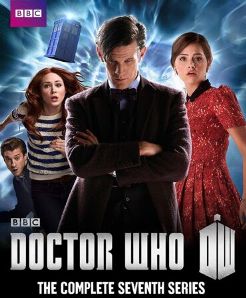
Matt Smith’s final year was sloppy. It started with a Xmas ep (the Narnia take-off Mother’s story) that didn’t require The Doctor nor include the companions. The regular season was split, acting as two very different seasons, with yet another Xmas ep in the middle. There were no 2-parters, for the first time in the NuWho’s run. The eps were supposed to be standalone, without the tight arcs of the previous two seasons, but each of the halves felt more connected than usual. Season 7A is the stronger half, following the family Pond, just watching them adjust as a family. It starts with a terrible, out-of-nowhere breakup, but that’s done away with quickly and it’s mostly lightness until River returns in a banger half-season finale that writes out the Ponds.
7B is more of a problem. Clara was introduced as a witty, energetic, and strong pre-companion in Asylum of the Daleks and reintroduced in The Snowmen. But when she appeared the 3rd time as a permanent companion, she was stripped of her agency and strength (which she would not regain for a season and a half). She had little of her personality. Eleven was supposed to be a more “grown up” version of himself, which was signified by a new outfit and new TARDIS interior, but the changes appeared only surface level to me. The arc of 7B was “Clara is a Mystery” and that ended with a whimper and a cheat.
This season has only one ep in my top 3rd and four in my bottom 3rd.
Note: The 50th Anniversary and Eleven’s regeneration eps are not considered parts of season 7, belonging to no season, though they wouldn’t change 7’s placement if I included them.
Best ep: The Angels Take Manhattan
Worst ep: Journey to the Centre of the TARDIS
#8 Season 6
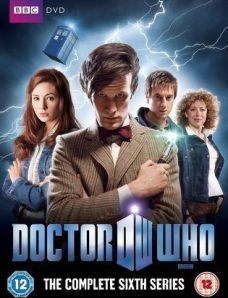 This is a strange season. With the exception of A Christmas Carol and The Doctor’s Wife, all the best episodes are part of the arc, but the arc completely falls apart into meaningless pudding and a huge cheat in the end. Still, I can’t recall having more fun with pudding and a cheat. It may not make sense, but it is moving so quickly, and is so entertaining, I didn’t notice until it was over. Amy & Rory are the heart of it all and are engaging and funny. River is the icing. Those three together are a riot, producing some of the funniest episodes of the show, while also pulling at heartstrings. Matt Smith continues to be an enjoyable and humorous Doctor. I can’t take him seriously as someone half the universe considers the most dangerous being alive, nor does he completely work as a love interest for River, but it is hard to beat him for wacky fun. As I will mention again below, this is one of the best TARDIS teams in Doctor Who history.
This is a strange season. With the exception of A Christmas Carol and The Doctor’s Wife, all the best episodes are part of the arc, but the arc completely falls apart into meaningless pudding and a huge cheat in the end. Still, I can’t recall having more fun with pudding and a cheat. It may not make sense, but it is moving so quickly, and is so entertaining, I didn’t notice until it was over. Amy & Rory are the heart of it all and are engaging and funny. River is the icing. Those three together are a riot, producing some of the funniest episodes of the show, while also pulling at heartstrings. Matt Smith continues to be an enjoyable and humorous Doctor. I can’t take him seriously as someone half the universe considers the most dangerous being alive, nor does he completely work as a love interest for River, but it is hard to beat him for wacky fun. As I will mention again below, this is one of the best TARDIS teams in Doctor Who history.
The non-arc eps were a tangle of repeats, giving us another stupid healing machine, another horror story based on a kid needing love, another thick morality tale on identity, and another joke ep that included defeating cybermen with love. Most of those weren’t bad, but were below average.
Best Ep: A Christmas Carol
Worst Ep: The God Complex
#8 60th-Anniversary Specials
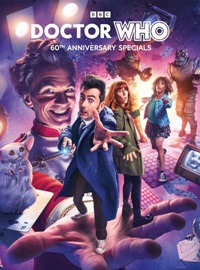 This 3-episode arc marks the return of Russell T. Davies, David Tennant, and Catherine Tate and it’s a celebration. It was a cry out to the universe that Doctor Who was back. This specials season earns its place with its consistency. The three specials (The Star Beast, Wild Blue Yonder, The Giggle) are all good: the plots are good, the themes are good, the production is good, but far more importantly, the characters are good. It’s all about the characters, and what it does with those characters, mainly The Doctor and Donna, makes this perhaps the most satisfying arc in the show’s history. Plus there were surprises–real surprises, things never done in Who before.
This 3-episode arc marks the return of Russell T. Davies, David Tennant, and Catherine Tate and it’s a celebration. It was a cry out to the universe that Doctor Who was back. This specials season earns its place with its consistency. The three specials (The Star Beast, Wild Blue Yonder, The Giggle) are all good: the plots are good, the themes are good, the production is good, but far more importantly, the characters are good. It’s all about the characters, and what it does with those characters, mainly The Doctor and Donna, makes this perhaps the most satisfying arc in the show’s history. Plus there were surprises–real surprises, things never done in Who before.
No, none of the individual specials are in the top 10 of all time. Season 7 has one episode better than any of these three, and Season 6 has several. But those also have multiple that are worse, far worse. There’s nothing dragging this “season” down. And having 2 episodes in my top third is an accomplishment that the show hasn’t achieved in eight years.
Best Ep: Wild Blue Yonder
Worst Ep: The Star Beast
#7 Season 9
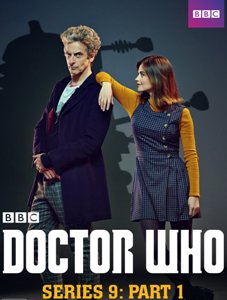 A huge improvement over S8, S9 avoided the depths of the last two seasons, with most of S9’s eps hovering a bit below the mid-point. It only broke into my top 3rd three times, with Heaven Sent, Hell Bent, and with the Christmas episode, The Husbands of River Song. But when it broke in, it really broke in, with two of those in my top 10 of all time. It had been three seasons since any ep had reached that top tier, and no episode from a later season, to this point, has come close.
A huge improvement over S8, S9 avoided the depths of the last two seasons, with most of S9’s eps hovering a bit below the mid-point. It only broke into my top 3rd three times, with Heaven Sent, Hell Bent, and with the Christmas episode, The Husbands of River Song. But when it broke in, it really broke in, with two of those in my top 10 of all time. It had been three seasons since any ep had reached that top tier, and no episode from a later season, to this point, has come close.
What worked was the improved Doctor. They’ve never shifted the personality of a Doctor so noticeably before, and only Sylvester McCoy’s and William Hartnell’s come close. Gone is the man who hates everything. In comes the old rocker, and him I want to watch. Clara returned to a character worth watching by finally reverting to the person we first saw as Soufflé Girl.
The arc was a non-starter, since Moffat’s main concern seemed to be setting up red herrings. The hybrid, Missy, and “Me” came to very little and the Time Lords should have been left out of the season.
S9 just edges out S6 and the 60th Anniversary Specials, not due to average quality, but by its best being so very good. There’s a good argument for moving it above the 2008-2010 Specials, but its four eps in my lowest 3rd drag it down.
Best ep: The Husbands of River Song
Worst ep: Sleep No More
#6 2008-2010 Specials
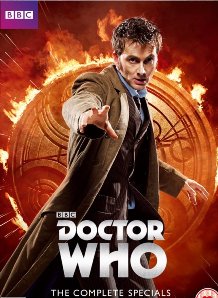 With five oversized episodes, the 2008-2010 Specials manage a half-season, and is as long as Flux. This is still when New Who was at it’s peak and David Tennant IS The Doctor. Great plots are necessary when it is a joy just to follow Ten in whatever he does. And there was one great plot. These specials are a mixture of fluff, the ridiculous, and the brilliant. Both Planet of the Dead and The Next Doctor get a lot of undeserved hate in Who Fandom, mostly due to expectations (did they really think that the Next Doctor in The Next Doctor was going to be The Doctor?). They are both pleasant upper mid-tier eps.
With five oversized episodes, the 2008-2010 Specials manage a half-season, and is as long as Flux. This is still when New Who was at it’s peak and David Tennant IS The Doctor. Great plots are necessary when it is a joy just to follow Ten in whatever he does. And there was one great plot. These specials are a mixture of fluff, the ridiculous, and the brilliant. Both Planet of the Dead and The Next Doctor get a lot of undeserved hate in Who Fandom, mostly due to expectations (did they really think that the Next Doctor in The Next Doctor was going to be The Doctor?). They are both pleasant upper mid-tier eps.
After the buildup in The Waters of Mars, I’d have liked to have seen a final for Tennant dealing more with his slip into godhood, but the long, wandering goodbye was satisfying. If I could chop off the last 25 minutes of that rambling two-parter and make it into its own episode, it would be the best of the “season” and one of the greats.
Best ep: The Waters of Mars
Worst ep: The End of Time
#5 Season 5
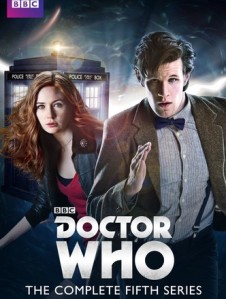 Matt Smith takes over, switching The Doctor from a brilliant, dangerous, romantic figure to a cocaine-fueled, slapstick comedian. It’s a move toward the series’ roots as a kid’s show. Luckily kids shows can be fun, and this one is. Eleven works well in the light eps, but doesn’t pull off the serious ones, and never appears dangerous, though he is supposed to. That may be the season’s (and Matt Smith’s run’s) biggest problem; he doesn’t have the gravitas of Tennant.
Matt Smith takes over, switching The Doctor from a brilliant, dangerous, romantic figure to a cocaine-fueled, slapstick comedian. It’s a move toward the series’ roots as a kid’s show. Luckily kids shows can be fun, and this one is. Eleven works well in the light eps, but doesn’t pull off the serious ones, and never appears dangerous, though he is supposed to. That may be the season’s (and Matt Smith’s run’s) biggest problem; he doesn’t have the gravitas of Tennant.
Amy is everything I’d want in a companion: strong, sexy, a bit wild, and smart. More than The Doctor, it is Amy who caries the season. Rory, the man who dies, starts off a bit bland, but improves greatly, growing into an excellent secondary companion, and he really shines in the finale. River is wonderful; though Alex Kingston has little chemistry with Matt Smith, it doesn’t generally matter in the season where their relationship is mainly one of flirting. Once again, we end up with one of the best TARDIS teams of all of Who.
Both the plot arc and character arc are unusually heavy, with the crack in time not only mentioned in all the episodes but actually playing a part in many. Luckily, it was an arc that worked–it’s arguably the best arc of the show. The new Matt Smith music is excellent if overused.
Best ep: The Eleventh Hour
Worst ep: The Hungry Earth / Cold Blood
#4 Season 3
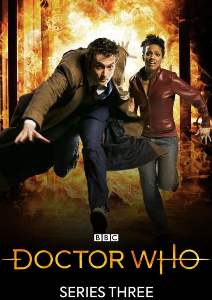 S3 was all over the place. Only Season 9 has as extreme quality changes. Leaping from The Family of Blood to The Daleks Take Manhattan can give you whiplash. However, most episodes are above the average. In the end, I rank it above S5 due to awarding more points for great episodes than the number I take away for terrible ones. And now, with so many weaker seasons, The Lazarus Experiment doesn’t seem quite as bad as it once did.
S3 was all over the place. Only Season 9 has as extreme quality changes. Leaping from The Family of Blood to The Daleks Take Manhattan can give you whiplash. However, most episodes are above the average. In the end, I rank it above S5 due to awarding more points for great episodes than the number I take away for terrible ones. And now, with so many weaker seasons, The Lazarus Experiment doesn’t seem quite as bad as it once did.
The arc is a complete failure for multiple reasons, but none more so than its ending, with mini-troll Doctor becoming Jesus due to the old Tinkerbell “kids wish really hard” shtick, the Master going for bad comedy, and the whole thing being undone. Basic rule with an seasonal arc: You have to stick the landing. This didn’t. Last of the Time Lords would be the worst ep if it wasn’t part of a two-parter, and gets slightly elevated by its first part.
Freema Agyeman could have made a good companion, but her Martha Jones was given nothing to do, and her failed love story was a bust.
On the other hand, don’t blink.
Best ep: Blink
Worst ep: The Lazarus Experiment
#3 Season 2
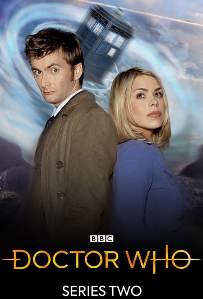 A new Doctor, and for my money, the best, along with a continuation of one of the great companions makes this a solid season. This was the most emotional season and the two leads had fantastic chemistry, which is why this season works. Often, what The Doctor and Rose are doing doesn’t matter, as long as they do it together. It’s them chatting that is so charming.
A new Doctor, and for my money, the best, along with a continuation of one of the great companions makes this a solid season. This was the most emotional season and the two leads had fantastic chemistry, which is why this season works. Often, what The Doctor and Rose are doing doesn’t matter, as long as they do it together. It’s them chatting that is so charming.
The Torchwood/Alternate World/Cyberman arc is well done. It isn’t overly intrusive while telling a story and not cheating in the end. And unlike other some Russel T Davis-era reset button stories, this one comes with a punch.
But S2 ends up in 3rd place because it can’t beat the writing for individual episodes in seasons 1 & 4. A majority of this season is in my top 3rd, with real standouts like The Girl in the Fireplace, and The Impossible Planet/The Satan Pit, in addition to the arc-heavy eps, but it barely cracks my top 10 and has several episodes below the 50% mark (Fear Her, The Idiots Lantern).
Best ep: The Girl in the Fireplace
Worst ep: The Idiot’s Lantern
#2 Season 4
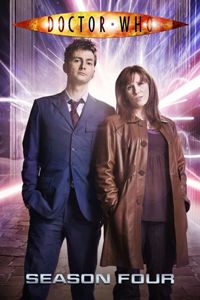 So much good: The Doctor is fantastic; Companion Donna starts overly shrill but ends up golden; The return of Martha, better than she was in her own season and of Rose, and both get better endings than they had previously. The Dalek/Doctor Donna arc is one of the best, finishing with a fan service episode that delivers exactly what this fan wanted while avoiding being embarrassing. And we get the introduction of River. There’s real emotion in these tales while also telling good stories and delving into the characters. Even the weaker episodes aren’t that weak, not compared to other seasons.
So much good: The Doctor is fantastic; Companion Donna starts overly shrill but ends up golden; The return of Martha, better than she was in her own season and of Rose, and both get better endings than they had previously. The Dalek/Doctor Donna arc is one of the best, finishing with a fan service episode that delivers exactly what this fan wanted while avoiding being embarrassing. And we get the introduction of River. There’s real emotion in these tales while also telling good stories and delving into the characters. Even the weaker episodes aren’t that weak, not compared to other seasons.
Season 4 has twelve episodes in my top 3rd (counting two-parters as 2), including multiple in the top 10.
Best ep: Silence in the Library / Forest of the Dead
Worst ep: Midnight
#1 Season 1
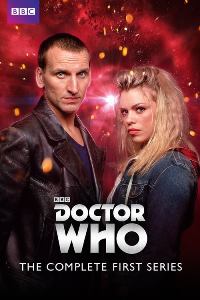 It started with the best. With 3 eps in my 10 ten (4 if you split the 2-parter), including #1, 12 eps in my top third, and none in the bottom 3rd, S1 easily ranks as the best season when considered episode by episode. The plot of the arc is wobbly to the extent that there was a season-long arc, but the real arc is the change in The Doctor, from broken, angry warrior to a Time Lord with a future, as well as the growth of Rose, and those both work beautifully.
It started with the best. With 3 eps in my 10 ten (4 if you split the 2-parter), including #1, 12 eps in my top third, and none in the bottom 3rd, S1 easily ranks as the best season when considered episode by episode. The plot of the arc is wobbly to the extent that there was a season-long arc, but the real arc is the change in The Doctor, from broken, angry warrior to a Time Lord with a future, as well as the growth of Rose, and those both work beautifully.
The character development was on point. We knew who these people were by the time the first episode ended, and each week we were given deeper insights and we watched them learn and change. Christopher Eccleston is one of the best Doctors of all of Who (both NuWho and Classic) and Rose in one of the finest companions, creating a top notch TARDIS team.
Add in Captain Jack (one of the two best secondary companions of all time), an amusing collection of tertiary characters, some well presented themes, and a lot of fun, and S1 sings. Even the world building (well, Universe building) was solid, which is not always where Doctor Who shines. This first season was highly emotional, more than the classic show ever was. It was easy to get immersed in this Doctor’s adventures. The music helps as well. Composer Murray Gold is a huge asset to the show.
The only flaw is that there isn’t more of it as Eccleston was a great Doctor and there was a lot more that he could have done. Perhaps his arc wouldn’t have had quite the power if he’d stuck around, but I’d have been willing to chance that.
Best ep: The Empty Child / The Doctor Dances
Worst ep: BoomTown
 Oh dear god, does Chibnall have no concept of story structure? FLUX is a single adventure split among 6 episodes. Two of those, War of the Sontarans and Village of the Angels, feel like stand alone eps that were rewritten to fit the longer work, but the other four eps cannot stand alone. And as a single, season long story, it is a mess. OK, the good first. The cinematography is very good, probably the best Doctor Who has ever been shot. And Yaz is much more of a character now, even with a bit of agency and less petulant. And while new companion Dan doesn’t do much, he is amiable and a pleasant addition. Semi-companion Jericho is also reasonably well developed. And I like the makeup and performance of the two villains, Swarm and Azure. And that’s it. The rest is junk.
Oh dear god, does Chibnall have no concept of story structure? FLUX is a single adventure split among 6 episodes. Two of those, War of the Sontarans and Village of the Angels, feel like stand alone eps that were rewritten to fit the longer work, but the other four eps cannot stand alone. And as a single, season long story, it is a mess. OK, the good first. The cinematography is very good, probably the best Doctor Who has ever been shot. And Yaz is much more of a character now, even with a bit of agency and less petulant. And while new companion Dan doesn’t do much, he is amiable and a pleasant addition. Semi-companion Jericho is also reasonably well developed. And I like the makeup and performance of the two villains, Swarm and Azure. And that’s it. The rest is junk. In comes a new Doctor and a new showrunner, creating a season of consistency. Unfortunately, it’s consistently not very good. It doesn’t have the worst episode, but it is close, and it never shines. A majority of the eps sit in the middle of the lower third of all modern Who. It’s easy to blame the generally drab writing, but the problem is larger, with the structure of the show. Perhaps three companions were too many. None of them develop personalities, or enough agency to do anything other than meekly obey The Doctor. And none of them have any kind of relationship with The Doctor. They are non-entities that hardly react, and when two of them are motivated by a recent death, not reacting is a huge problem. This is one of the worst depictions of widowhood I’ve ever seen.
In comes a new Doctor and a new showrunner, creating a season of consistency. Unfortunately, it’s consistently not very good. It doesn’t have the worst episode, but it is close, and it never shines. A majority of the eps sit in the middle of the lower third of all modern Who. It’s easy to blame the generally drab writing, but the problem is larger, with the structure of the show. Perhaps three companions were too many. None of them develop personalities, or enough agency to do anything other than meekly obey The Doctor. And none of them have any kind of relationship with The Doctor. They are non-entities that hardly react, and when two of them are motivated by a recent death, not reacting is a huge problem. This is one of the worst depictions of widowhood I’ve ever seen. Containing Eve of the Daleks, Legend of the Sea Devils, and The Power of the Doctor, the 2022 Specials continue with the quality, or lack-there-of, that’s marked the Chris Chibnall era. There are unnecessary characters, pointless diversions, and juvenile themes while lacking the fun of earlier eras. And like FLUX, these specials were affected by the COVID lockdown, which is partly to blame for the poor editing and FX of The Sea Devils. On the plus side, only having two companions helped to give each a bit of room to breath, and Dan was the best companion of the era, bringing much needed lightness and fun. And I tend to be rough on Chibnall’s esthetic, but these eps don’t look bad (discounting the editing and FX of The Sea Devils).
Containing Eve of the Daleks, Legend of the Sea Devils, and The Power of the Doctor, the 2022 Specials continue with the quality, or lack-there-of, that’s marked the Chris Chibnall era. There are unnecessary characters, pointless diversions, and juvenile themes while lacking the fun of earlier eras. And like FLUX, these specials were affected by the COVID lockdown, which is partly to blame for the poor editing and FX of The Sea Devils. On the plus side, only having two companions helped to give each a bit of room to breath, and Dan was the best companion of the era, bringing much needed lightness and fun. And I tend to be rough on Chibnall’s esthetic, but these eps don’t look bad (discounting the editing and FX of The Sea Devils). It’s like Season 11, with all its flaws, but a little better. Not much, but a little. The Doctor is still too unchanging, the companions are still drab and have no relationship with The Doctor (but do become petulant once, which is not an improvement), the production is still weak, and the message is still only suited to pre-teens, but individual eps are a step up. The big change was more references to older seasons, with a lot of returning villains, which isn’t in itself good, but the writers seemed to have a better idea of what to do with those.
It’s like Season 11, with all its flaws, but a little better. Not much, but a little. The Doctor is still too unchanging, the companions are still drab and have no relationship with The Doctor (but do become petulant once, which is not an improvement), the production is still weak, and the message is still only suited to pre-teens, but individual eps are a step up. The big change was more references to older seasons, with a lot of returning villains, which isn’t in itself good, but the writers seemed to have a better idea of what to do with those.
 If I gave equal weight to the bad episodes in a season, S8 would end up worse than S12, as this season has some truly awful eps. It has both the very worst and the third-worst. But it also has multiple mediocre eps, which isn’t something to be proud of, but is more than S11 or 12 can say.
If I gave equal weight to the bad episodes in a season, S8 would end up worse than S12, as this season has some truly awful eps. It has both the very worst and the third-worst. But it also has multiple mediocre eps, which isn’t something to be proud of, but is more than S11 or 12 can say. Disappointing is the word of the season. With the return of RTD, the finest show-runner Doctor Who ever had, I expected a lot, and got less. Yes, he fixed a lot of problems, but he introduced some as well. And while there was a lot of good to the season, that disappointment leads to the bad standing out.
Disappointing is the word of the season. With the return of RTD, the finest show-runner Doctor Who ever had, I expected a lot, and got less. Yes, he fixed a lot of problems, but he introduced some as well. And while there was a lot of good to the season, that disappointment leads to the bad standing out.
 This is a strange season. With the exception of A Christmas Carol and The Doctor’s Wife, all the best episodes are part of the arc, but the arc completely falls apart into meaningless pudding and a huge cheat in the end. Still, I can’t recall having more fun with pudding and a cheat. It may not make sense, but it is moving so quickly, and is so entertaining, I didn’t notice until it was over. Amy & Rory are the heart of it all and are engaging and funny. River is the icing. Those three together are a riot, producing some of the funniest episodes of the show, while also pulling at heartstrings. Matt Smith continues to be an enjoyable and humorous Doctor. I can’t take him seriously as someone half the universe considers the most dangerous being alive, nor does he completely work as a love interest for River, but it is hard to beat him for wacky fun. As I will mention again below, this is one of the best TARDIS teams in Doctor Who history.
This is a strange season. With the exception of A Christmas Carol and The Doctor’s Wife, all the best episodes are part of the arc, but the arc completely falls apart into meaningless pudding and a huge cheat in the end. Still, I can’t recall having more fun with pudding and a cheat. It may not make sense, but it is moving so quickly, and is so entertaining, I didn’t notice until it was over. Amy & Rory are the heart of it all and are engaging and funny. River is the icing. Those three together are a riot, producing some of the funniest episodes of the show, while also pulling at heartstrings. Matt Smith continues to be an enjoyable and humorous Doctor. I can’t take him seriously as someone half the universe considers the most dangerous being alive, nor does he completely work as a love interest for River, but it is hard to beat him for wacky fun. As I will mention again below, this is one of the best TARDIS teams in Doctor Who history. This 3-episode arc marks the return of Russell T. Davies, David Tennant, and Catherine Tate and it’s a celebration. It was a cry out to the universe that Doctor Who was back. This specials season earns its place with its consistency. The three specials (The Star Beast, Wild Blue Yonder, The Giggle) are all good: the plots are good, the themes are good, the production is good, but far more importantly, the characters are good. It’s all about the characters, and what it does with those characters, mainly The Doctor and Donna, makes this perhaps the most satisfying arc in the show’s history. Plus there were surprises–real surprises, things never done in Who before.
This 3-episode arc marks the return of Russell T. Davies, David Tennant, and Catherine Tate and it’s a celebration. It was a cry out to the universe that Doctor Who was back. This specials season earns its place with its consistency. The three specials (The Star Beast, Wild Blue Yonder, The Giggle) are all good: the plots are good, the themes are good, the production is good, but far more importantly, the characters are good. It’s all about the characters, and what it does with those characters, mainly The Doctor and Donna, makes this perhaps the most satisfying arc in the show’s history. Plus there were surprises–real surprises, things never done in Who before. A huge improvement over S8, S9 avoided the depths of the last two seasons, with most of S9’s eps hovering a bit below the mid-point. It only broke into my top 3rd three times, with Heaven Sent, Hell Bent, and with the Christmas episode, The Husbands of River Song. But when it broke in, it really broke in, with two of those in my top 10 of all time. It had been three seasons since any ep had reached that top tier, and no episode from a later season, to this point, has come close.
A huge improvement over S8, S9 avoided the depths of the last two seasons, with most of S9’s eps hovering a bit below the mid-point. It only broke into my top 3rd three times, with Heaven Sent, Hell Bent, and with the Christmas episode, The Husbands of River Song. But when it broke in, it really broke in, with two of those in my top 10 of all time. It had been three seasons since any ep had reached that top tier, and no episode from a later season, to this point, has come close. With five oversized episodes, the 2008-2010 Specials manage a half-season, and is as long as Flux. This is still when New Who was at it’s peak and David Tennant IS The Doctor. Great plots are necessary when it is a joy just to follow Ten in whatever he does. And there was one great plot. These specials are a mixture of fluff, the ridiculous, and the brilliant. Both Planet of the Dead and The Next Doctor get a lot of undeserved hate in Who Fandom, mostly due to expectations (did they really think that the Next Doctor in The Next Doctor was going to be The Doctor?). They are both pleasant upper mid-tier eps.
With five oversized episodes, the 2008-2010 Specials manage a half-season, and is as long as Flux. This is still when New Who was at it’s peak and David Tennant IS The Doctor. Great plots are necessary when it is a joy just to follow Ten in whatever he does. And there was one great plot. These specials are a mixture of fluff, the ridiculous, and the brilliant. Both Planet of the Dead and The Next Doctor get a lot of undeserved hate in Who Fandom, mostly due to expectations (did they really think that the Next Doctor in The Next Doctor was going to be The Doctor?). They are both pleasant upper mid-tier eps. Matt Smith takes over, switching The Doctor from a brilliant, dangerous, romantic figure to a cocaine-fueled, slapstick comedian. It’s a move toward the series’ roots as a kid’s show. Luckily kids shows can be fun, and this one is. Eleven works well in the light eps, but doesn’t pull off the serious ones, and never appears dangerous, though he is supposed to. That may be the season’s (and Matt Smith’s run’s) biggest problem; he doesn’t have the gravitas of Tennant.
Matt Smith takes over, switching The Doctor from a brilliant, dangerous, romantic figure to a cocaine-fueled, slapstick comedian. It’s a move toward the series’ roots as a kid’s show. Luckily kids shows can be fun, and this one is. Eleven works well in the light eps, but doesn’t pull off the serious ones, and never appears dangerous, though he is supposed to. That may be the season’s (and Matt Smith’s run’s) biggest problem; he doesn’t have the gravitas of Tennant. S3 was all over the place. Only Season 9 has as extreme quality changes. Leaping from The Family of Blood to The Daleks Take Manhattan can give you whiplash. However, most episodes are above the average. In the end, I rank it above S5 due to awarding more points for great episodes than the number I take away for terrible ones. And now, with so many weaker seasons, The Lazarus Experiment doesn’t seem quite as bad as it once did.
S3 was all over the place. Only Season 9 has as extreme quality changes. Leaping from The Family of Blood to The Daleks Take Manhattan can give you whiplash. However, most episodes are above the average. In the end, I rank it above S5 due to awarding more points for great episodes than the number I take away for terrible ones. And now, with so many weaker seasons, The Lazarus Experiment doesn’t seem quite as bad as it once did. A new Doctor, and for my money, the best, along with a continuation of one of the great companions makes this a solid season. This was the most emotional season and the two leads had fantastic chemistry, which is why this season works. Often, what The Doctor and Rose are doing doesn’t matter, as long as they do it together. It’s them chatting that is so charming.
A new Doctor, and for my money, the best, along with a continuation of one of the great companions makes this a solid season. This was the most emotional season and the two leads had fantastic chemistry, which is why this season works. Often, what The Doctor and Rose are doing doesn’t matter, as long as they do it together. It’s them chatting that is so charming. So much good: The Doctor is fantastic; Companion Donna starts overly shrill but ends up golden; The return of Martha, better than she was in her own season and of Rose, and both get better endings than they had previously. The Dalek/Doctor Donna arc is one of the best, finishing with a fan service episode that delivers exactly what this fan wanted while avoiding being embarrassing. And we get the introduction of River. There’s real emotion in these tales while also telling good stories and delving into the characters. Even the weaker episodes aren’t that weak, not compared to other seasons.
So much good: The Doctor is fantastic; Companion Donna starts overly shrill but ends up golden; The return of Martha, better than she was in her own season and of Rose, and both get better endings than they had previously. The Dalek/Doctor Donna arc is one of the best, finishing with a fan service episode that delivers exactly what this fan wanted while avoiding being embarrassing. And we get the introduction of River. There’s real emotion in these tales while also telling good stories and delving into the characters. Even the weaker episodes aren’t that weak, not compared to other seasons. It started with the best. With 3 eps in my 10 ten (4 if you split the 2-parter), including #1, 12 eps in my top third, and none in the bottom 3rd, S1 easily ranks as the best season when considered episode by episode. The plot of the arc is wobbly to the extent that there was a season-long arc, but the real arc is the change in The Doctor, from broken, angry warrior to a Time Lord with a future, as well as the growth of Rose, and those both work beautifully.
It started with the best. With 3 eps in my 10 ten (4 if you split the 2-parter), including #1, 12 eps in my top third, and none in the bottom 3rd, S1 easily ranks as the best season when considered episode by episode. The plot of the arc is wobbly to the extent that there was a season-long arc, but the real arc is the change in The Doctor, from broken, angry warrior to a Time Lord with a future, as well as the growth of Rose, and those both work beautifully.















